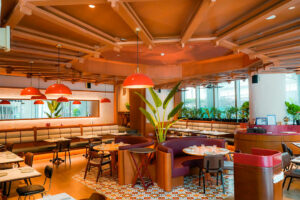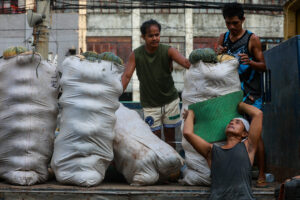
A quiet Thai sibling
WHERE UMA NOTA, Alex Offe and Michael J. Needham’s 2024 offering is grand and glamorous, Sabai, a new outlet from this partnership, is quiet and cozy.
BusinessWorld went to a tasting at Sabai on the Ground Floor of Shangri-La The Fort on Oct. 27. It’s right beside its glamorous older sister, which bids you to go down a staircase to partake of fun not to be seen in the light. At Sabai, launched at lunchtime, sunlight streamed into the windows and overall had a more casual vibe.
Mr. Offe, co-founder of Uma Nota in Paris and Hong Kong (since closed) brought gathered media guests around the three private rooms (two of which have karaoke sound systems). We made a stop around the kitchen, where he pointed out that six of their staff are Thai: the head chef, the sous-chef, and four chefs de partie. “If you ask me to cook Chinese food, I can probably do an okay job, but there are things you just can’t teach,” he said about the chefs. “Only a well-trained palate is able to make adaptations on a recipe, on the spot.”
Leading the kitchen is Head Chef Puwadol Assavadathkamjorn, a native of Southern Thailand. He brings experience from Michelin-starred Le Normandie by Alain Roux and Pru Restaurant, and Sühring in Bangkok, with two Michelin stars.
Sabai (meaning “relaxed” or “comfortable” in Thai; and a homonym for Filipino’s “together”) doesn’t have all the heated flourishes we’ve become accustomed to when it comes to Thai food. If anything, the meal served to us on the launch proved its name, tasting like something straight out of a Thai household.
The Pork Belly with Five Spices (braised pork in Chinese five-spice broth, slow cooked over two nights) tasted like the Philippines’ humba (similar, but with the addition of black beans or nuts, depending on where you are) and was strangely comforting. We could say the same about the Spicy Dry Fish Broth with bangus (milkfish) and mushrooms, infused with herbs like kaffir lime and Thai basil — it amounted to a familiar, clean-tasting sinigang (a soup of proteins in a sour broth) with a little bit more zing.
That’s not us being unappreciative; that’s us forming a bond with our Southeast Asian neighbors, but also proving the Thais right when they say “same same, but different.” There was a Crispy Fermented Pork, which tasted like a complex adobo (albeit the kind fried in its own fat), and the shrimp paste relish (our bagoong, but served with vegetables). This we paired with something uniquely theirs, that has no analog within our shores, the Crispy Catfish Salad, served looking like a cloud, and breaking apart in the mouth with an audible crunch.
Mr. Offe said that he spent months in Thailand to really get a taste of what that country has to offer. “The food is the same approach: trying to be as authentic and true as possible.” The spice levels have been adjusted to local palates, but otherwise, the chefs keep it as close as possible to the flavors back home. More importantly, a large part of the ingredients comes from Thailand. What couldn’t be brought here, or would be otherwise compromised during shipping, they’ve decided to plant here in local farms, with the seeds coming from Thailand.
As Mr. Offe’s second venture in the Philippines, he talks opening perhaps another restaurant next year. Asked how Uma Nota and Sabai fit together despite their radically different personalities, he said, “We’re trying to create a collection of memorable dining experiences. Different priorities, different ways to celebrate.”
Coming from more cosmopolitan cities like Paris and Hong Kong, he also discussed what he likes about Manila for him to keep opening restaurants here: “It’s a city that’s up and coming.”
This was a few days before Uma Nota’s bartender Benjamin Leal won the Exceptional Cocktails Award at the first Philippine Michelin Awards. Uma Nota itself was included in the list of Selected Restaurants for the country’s 2026 Michelin Guide. “It’s about time that Manila is recognized, and the Philippines is recognized for its energy and opportunities.” — Joseph L. Garcia



